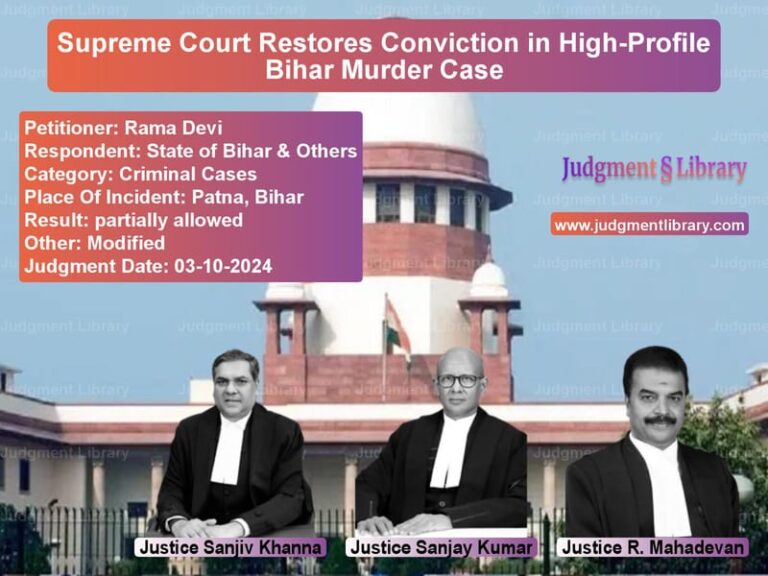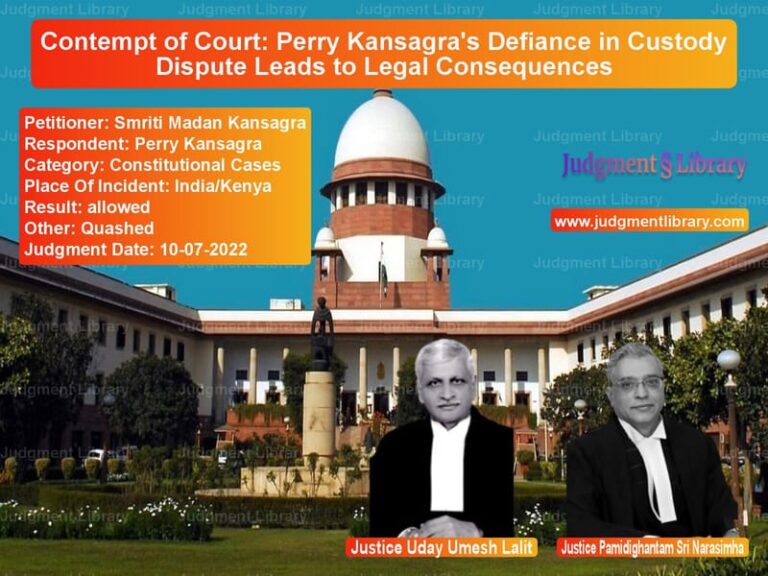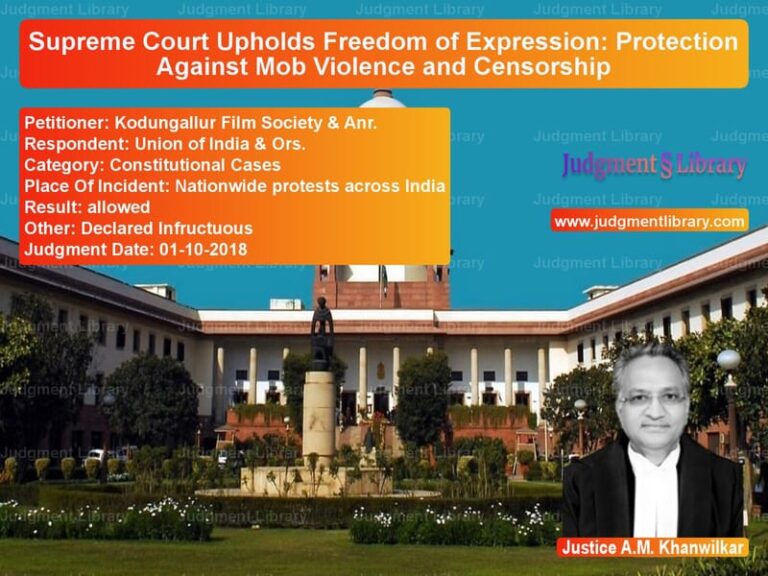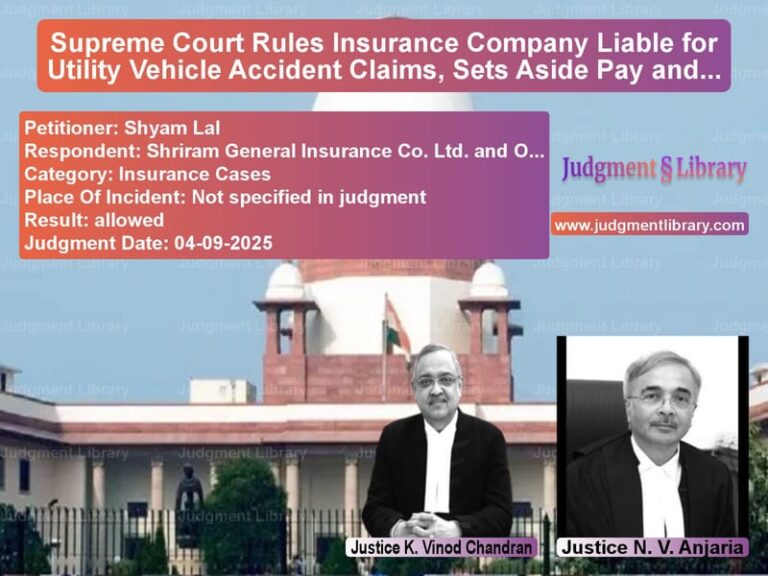Eviction and Bona Fide Requirement: Supreme Court’s Ruling on Uttar Pradesh Urban Buildings Act
The Supreme Court of India, in its judgment dated February 7, 2017, delivered an important ruling in the case of Nidhi vs. Ram Kripal Sharma (D) Through LRs. This case revolved around the interpretation of Section 21(1)(a) of the Uttar Pradesh Urban Buildings (Regulation of Letting, Rent, and Eviction) Act, 1972, which allows landlords to seek eviction of tenants on the ground of bona fide personal requirement.
The primary issue before the Court was whether the marriage of the appellant (landlady) during the pendency of the case would extinguish her bona fide need for the property. The Supreme Court ruled in favor of the landlady, holding that subsequent events like marriage do not automatically negate the landlord’s genuine need. The judgment reaffirms that a landlord’s requirement must be assessed based on the circumstances existing at the time of filing the eviction petition, and later developments should not unfairly disadvantage the landlord.
Background of the Case
The appellant, Nidhi, was the owner and landlord of a non-residential property in Uttar Pradesh. The premises had been let out by her ancestors when they did not require it for personal use. The previous owner of the accommodation, Smt. Krishna Devi, had sufficient space to reside elsewhere. Upon her death, Nidhi inherited the property and continued receiving rent from the respondent-tenant, Ram Kripal Sharma.
In 1987, Nidhi filed a release application under Section 21(1)(a) of the Uttar Pradesh Urban Buildings (Regulation of Letting, Rent, and Eviction) Act, 1972, seeking possession of the premises on the ground of her bona fide personal requirement. She claimed that she needed the premises for the following reasons:
- Her grandparents needed to move in with her for medical care.
- She and her younger sister required separate rooms for study.
- The respondent’s hotel business was a namesake operation, run mostly by his servant, and he had other means of livelihood.
Tenant’s Arguments
The respondent-tenant resisted the eviction petition, arguing:
- Nidhi and her family resided in a large house called Kath Mahal, which had ample space.
- Her grandparents were wealthy landlords in their village and owned a palatial house.
- His hotel business was his primary source of income, and relocating would cause hardship.
Decisions of Lower Courts
The Prescribed Authority ruled in favor of Nidhi, granting her possession of the premises. The authority held that:
- Nidhi’s bona fide requirement was genuine.
- The tenant could easily find an alternative commercial space.
- The tenant was ordered to vacate, subject to compensation equal to two years of rent.
The respondent-tenant appealed before the Additional District Judge, Moradabad, who reversed the Prescribed Authority’s order. The appellate court held that:
- Nidhi’s requirement was not immediate or pressing.
- She already had sufficient residential space.
Aggrieved by the order, Nidhi filed a writ appeal before the Allahabad High Court, which upheld the appellate court’s decision. The High Court noted that:
- Nidhi had married in 1996 and moved with her husband, an Indian Revenue Service (IRS) officer.
- Her sisters had also married and moved out.
- The original need had ceased to exist due to these subsequent developments.
Supreme Court’s Ruling
The Supreme Court disagreed with the High Court and ruled in favor of Nidhi. The key findings were:
- Marriage does not extinguish bona fide need: The Court held that the requirement of a property for a family does not vanish simply because the landlady gets married. The need existed at the time of filing the petition and should be judged accordingly.
- Comparative hardship test: The tenant had an alternative business (a sweet shop) and could relocate, whereas Nidhi’s family had a genuine need for the premises.
- Landlord’s right to use property: The Court reaffirmed that a landlord is entitled to reclaim possession if the need is legitimate.
Conclusion
The Supreme Court set aside the orders of the High Court and the Additional District Judge and restored the order of the Prescribed Authority, allowing Nidhi’s release application. The judgment reinforces the principle that:
- A landlord’s need should be assessed at the time of filing the petition.
- Subsequent events (such as marriage) should not unfairly disadvantage the landlord.
- Eviction laws should be interpreted in a manner that balances the rights of both tenants and landlords.
This ruling serves as a landmark decision in landlord-tenant disputes under the Uttar Pradesh Urban Buildings Act, ensuring that bona fide requirements are not dismissed due to procedural delays or natural life developments.
Don’t miss out on the full details! Download the complete judgment in PDF format below and gain valuable insights instantly!
Download Judgment: Nidhi vs Ram Kripal Sharma (D Supreme Court of India Judgment Dated 07-02-2017.pdf
Direct Downlaod Judgment: Direct downlaod this Judgment
See all petitions in Property Disputes
See all petitions in Landlord-Tenant Disputes
See all petitions in Specific Performance
See all petitions in Judgment by Dipak Misra
See all petitions in Judgment by R. Banumathi
See all petitions in allowed
See all petitions in Remanded
See all petitions in supreme court of India judgments February 2017
See all petitions in 2017 judgments
See all posts in Civil Cases Category
See all allowed petitions in Civil Cases Category
See all Dismissed petitions in Civil Cases Category
See all partially allowed petitions in Civil Cases Category







